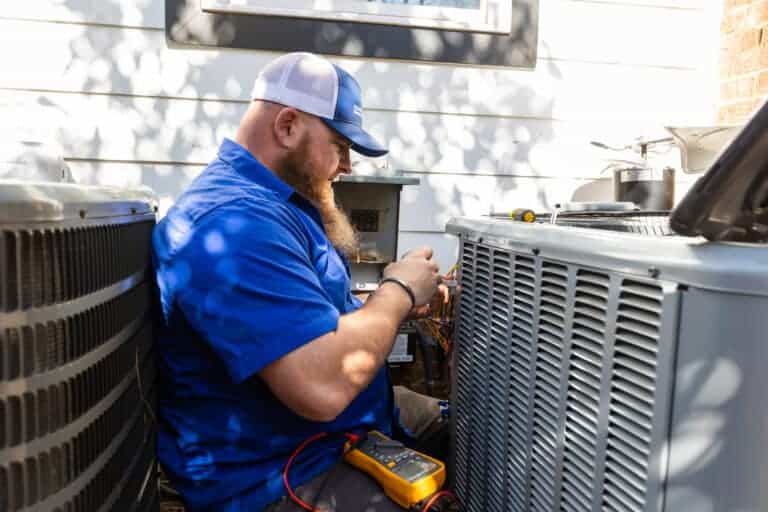A leak that lets the refrigerant out of the air conditioner (AC) is one of the more frequent problems it might have. The heat-transfer fluid known as refrigerant enables an AC to draw heat from a house, chill it down, and then release the heat outdoors. The charge of your AC is the specific amount of refrigerant that is contained within it. Throughout the AC’s life, this level will stay the same unless a leak occurs.
Does running AC with low refrigerant still run better than usual, would it still function and continue to cool your house? For whatever reason you think your AC may be leaking refrigerant, shut it off, contact a professional to fix it, and recharge the refrigerant to the manufacturer’s level.
Keep reading if you should continue running AC with low refrigerant.
Can I Continue Running AC With Low Refrigerant?

Can I Keep Running the AC With a Low Refrigerant? Yes, but your AC system wouldn’t be able to chill your house adequately if there was no refrigerant at all. However, you might still be able to feel cool AC from your system if your levels are low. Could your AC still function with low refrigerant? Refrigerant is necessary for AC to remove heat from the air.
Since many parts of your AC depend on a specific concentration of this chemical mixture to function, you shouldn’t try to run your AC on low refrigerant. A technician should carefully measure out the proper amounts of refrigerant while installing an AC. Inaccurate levels could indicate that your unit was not initially configured correctly. Still, there’s a good chance that this was caused by a leak.
Over time, corrosion or faulty connections may cause your system to leak refrigerant. You might not even feel any cool air coming from your unit if it keeps leaking. However, even somewhat reduced levels could lead to issues with some crucial parts, such as the compressor. The compressor is in charge of converting refrigerant into a pressurized gas so that the system as a whole can pump it. This component’s size is determined by the cooling capacity of your AC and how much refrigerant it can handle. This amount will become too low, causing issues with your compressor that can even require replacement.
Low refrigerant can cause wear and tear on several parts of your AC. Furthermore, your AC will consume a lot of energy to reach the required temperature when the components in your system have to work harder to cool your house. This indicates that you are overspending each month and that your AC may already be eating up a sizable amount of your expenses.
Make repairs as soon as you suspect a leak and schedule maintenance twice a year to prevent unexpected breakdowns and high expenses.
Hazards Of Running AC With Low Refrigerant
If you don’t want to deal with the heat, you could choose to continue running AC with low refrigerant.
AC Compressor Breakdown
The compressor in AC systems keeps the refrigerant flowing and makes sure it gets to the proper places. Running your AC when you need more power might lead to a catastrophic compressor breakdown, which is one of the main issues. This is a costly repair that may come close to matching the retail cost of a new system.
Icy Coils
Due to its ability to keep the air cool, the evaporator coil is a crucial component of the AC system. The coils may get a thin coating of ice if there is insufficient refrigerant. This could damage the entire AC and reduce the system’s efficiency. Even worse, it may damage the filter and reduce the indoor air quality in your house.
Lack of Coziness
You run the risk of the AC system losing its ability to cool you besides being extremely hot and uncomfortable. As a result, to get through the sweltering, humid summers, you will either need to replace or repair the AC.
Lower Cooling Force
The amount of refrigerant, or “system charge,” that an AC is intended to run on is determined by design. The system’s capacity to efficiently remove heat from inside spaces and release it outdoors becomes compromised if this level drops.
Signs Of Running AC With Low Refrigerant
It might be difficult to diagnose problems as a homeowner until everything has suddenly stopped functioning. Sometimes you can identify it early and save a more costly repair if you observe the inside temperature and humidity gradually rising.
Here are a few signs of running AC with low refrigerant:
Bubbling Or Hissing Sounds
The indoor evaporator coil or outdoor condensing unit may occasionally make a bubbling or hissing sound if you have a very large leak. In this scenario, the temperature in your house may rise and rapidly become uncomfortable.
Ice Or Frost On Copper Wires
Your AC will be severely taxed by restricted airflow, which also increases the risk of an evaporator coil freezing up and malfunctioning. A frozen interior coil can also result from other poor airflow sources, such as unclean air filters.
Increased Electric Bills
Usually, we don’t look at an increased electric bill as the first sign. Utility expenses will inevitably rise during an exceptionally hot summer due to electricity costs. That does not always imply that there is a refrigerant issue. When there is insufficient refrigerant in the AC, it will keep functioning far longer than it should in trying to chill the house.
Not Enough Cool Blowing
There may occasionally be a refrigerant issue if it feels significantly warmer than it should. Remember that when the outdoor temperature reaches 100 degrees, your AC might not blow cool air.
Pooling Water Near The Furnace
Your AC that has frozen over time could melt and begin to drip any accumulated condensation.
Short Cycling
An AC that short cycles start up, runs for a brief period, and then shuts off. What occurs is that a full cooling cycle is never completed by your AC.
Refrigerant Leak Repairs and Cost Considerations
Common Repair Methods
- Leak detection and sealing – HVAC professionals use specialized tools to find and seal leaks.
- Refrigerant recharge – After sealing the leak, the system needs a Freon refill to restore cooling performance.
- Evaporator coil repair or replacement – If leaks are severe, the evaporator coil may need fixing or replacing.
- Compressor replacement – If low refrigerant has caused major compressor damage, replacement may be necessary.
Cost Breakdown
- Leak detection – $150 to $500, depending on the method used.
- Refrigerant recharge – $200 to $600, based on the type and amount of refrigerant.
- Evaporator coil replacement – $600 to $2,000, depending on unit size.
- Compressor replacement – $1,200 to $3,000, depending on AC model and labor costs.
- Preventive maintenance – $75 to $200 per visit, helping avoid expensive repairs.
Factors Affecting Costs
- Size and severity of the leak – Larger leaks require more refrigerant and labor.
- Type of refrigerant used – Older refrigerants (like R-22 Freon) are more expensive than newer, eco-friendly refrigerants.
- AC system lifespan – Older units may require frequent repairs, making replacement a better option.
- Energy consumption increase – Running an AC with low refrigerant raises electricity costs over time.
Takes Time To Cool Down
If it takes your house longer and longer to cool down, there may be a refrigerant issue. There could be no apparent reason why the temperature and humidity on the house thermostat are slowly rising. When your AC functions better in the evening but not throughout the day, this is another classic sign.
Contact HVAC repair professionals right away if you detect any warning signs of a refrigerant leak, such as a decline in cooling, frost around the coils, an AC that runs constantly, or hissing noises!
Frequently Asked Questions
What happens if you run AC with low refrigerant?
Running your AC with low refrigerant can cause several issues, including reduced cooling efficiency, increased energy consumption, and potential damage to critical components like the compressor. Over time, running with low refrigerant can lead to expensive repairs and could result in complete system failure.
Is it safe to run AC with a refrigerant leak?
No, it is not safe to run your AC with a refrigerant leak. A leak means your system is losing refrigerant, which is essential for cooling. Running the AC in this condition can lead to inefficient cooling, increased energy consumption, and potential damage to the compressor and other critical components. It’s best to shut off the AC and contact a professional for repairs.
How do I know if my AC is leaking refrigerant?
If you suspect your AC might be leaking refrigerant, watch for signs such as bubbling or hissing sounds from the unit, ice or frost on the coils, higher electric bills, and insufficient cooling. These could indicate that the refrigerant levels are low due to a leak. If you notice any of these signs, it’s best to contact an HVAC professional to inspect and repair the system.



